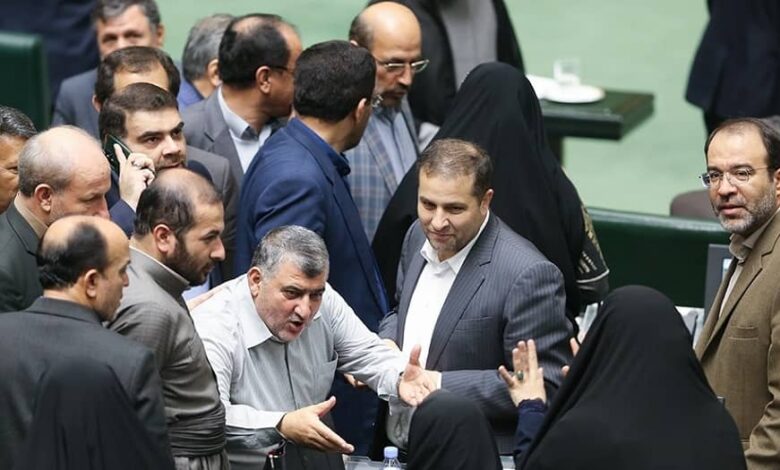The Origins and Impact of a Failed Consolidation Project in Iran

iran majlis parliament fight (1)
Written by
Mahmoud Hakamian
A little over two years have passed since Supreme Leader Ali Khamenei’s ambition for a unified regime came true. However, it came at the cost of significant internal turmoil and a major decline in the authoritarian rule’s followership as members and supporters of the disfavored factions begrudgingly joined the huge masses of the dissenting population in their desire for Khamenei and his president Ebrahim Raisi to fail.
As early as May 2022, less than a year after the cabinet of Ebrahim Raisi was sworn in, the state-run Khabar Online ran an article titled, “Absolute Rule: A Challenged Dream”.
The piece stated, “In a situation where governance is amalgamated, and the authorities originate from a single political faction, the majority of the population, even a spectrum of street-level supporters and the body of this political current, are more dissatisfied than ever with the existing inefficiencies and the overall disarray, particularly in the realm of livelihood.”
After a span of over two years, the entire “consolidation project” has circled back to square one. The Raisi administration finds itself in a perpetual struggle with the parliament led by Mohammad Bagher Ghalibaf. The Judiciary is wielding threats against parliamentary members, and Ebrahim Raisi is resorting to sending complaint letters to Khamenei, seeking his intervention to pave the way forward.
The state-run newspaper Ebtekar wrote on October 28, “It seems like some members of the parliament do not consider government officials very competent, and it appears that they do not accept their work. Perhaps that is why some bills presented by the government to the parliament undergo significant changes in parliamentary committees; changes that government officials object to and believe that their proposed bills have been altered.”
The source added, “In the context of changes made to the Seventh Development Plan bill, unlike Hassan Rouhani, Ebrahim Raisi personally wrote a letter to the Supreme Leader expressing concerns about the extensive alterations made by members of parliament to the bill. He highlighted that if the parliament’s reconciliation committee’s decisions are approved, the government will be unable to execute the Seventh Development Plan due to the substantial financial burden it imposes on the government.”
#Iranian state officials warn about low morale among the ranks of the regime. Watch and judge if this is indicative of a defection crisis amid #IranRevolution2022 pic.twitter.com/U6TJS5QrqO
— NCRI-FAC (@iran_policy) December 27, 2022
The situation has reached a point where even the trifold meeting of the “leaders of the three branches,” meant to synchronize the regime’s senior leaders, cannot prevent the crises. Even Khamenei’s frequent calls for unity and collaboration among the branches have fallen on deaf ears.
By the third week of October, the official newspaper Iran, a mouthpiece of Raisi’s government, blamed the budget deficit on the parliament’s incorrect estimation of oil revenues, especially in the first seven months of this year.
The state-affiliated Ruydad24 website, linked to the opposing faction, stated on October 24 that the government’s claim of boosting oil sales under Raisi’s leadership has proven untrue. They argued that the budget deficit for the first four months of the year is no less than 258 trillion tomans.
Etemad Newspaper also wrote on the same day, “The financial performance report of the government from the first four months of this year shows that only 63% of the required budget resources were realized during this period. In other words, the government had a deficit of 258 trillion tomans by the end of the month of June this year.”
At the same time, the inability of the Raisi administration to address any socio-economic issue is having a significant impact on the most disadvantaged members of Iranian society.
The #Iranian regime's power consolidation plan crumbles under the weight of its own shortcomings.https://t.co/ErwiobZpJO
— NCRI-FAC (@iran_policy) May 27, 2023
Vahid Shaghayeghi Shahri, a state-affiliated economist, forecasted increasingly challenging times for the people’s livelihoods and acknowledged that taxes constituted the government’s primary source of revenue during this period. In light of this situation, it is anticipated that tax hikes and a decline in people’s living standards will persist until the end of the year.
In a report on October 28, the government-affiliated Jahan Sanat revealed that under the Raisi administration, Iran has plummeted to the 160th position in the global Fraser Economic Freedom Index, out of 165 countries. Iran now shares this ranking with countries such as Congo, Algeria, Argentina, Libya, Yemen, Sudan, Syria, Zimbabwe, and Venezuela.
Yahya Ebrahimi, a member of the Parliamentary Commission on Health and Treatment, who has essentially been brought into the parliament through the support of Raisi’s faction, addressed the causes of the medicine shortage. Ebrahimi emphasized, “The issue lies in our lack of transparency with the public. We persist in spreading falsehoods while anticipating that the people will trust us. Even the government is aware that the public doesn’t buy into these deceptions, yet it clings to this strategy. People’s awareness and understanding is above the language you employ, and the populace can see through these untruths.”
A close examination of the complex and interconnected socio-political crises in Iran reveals the growing fear within the clerical dictatorship of an impending revolution. Consequently, their strategy of exporting these crises abroad and inciting regional conflicts is more a sign of desperation than the show of strength that Khamenei would like the world to believe. Understanding the underlying causes and origins of the problem makes the solution clear: Iran’s yearning for change can only be realized from within.

